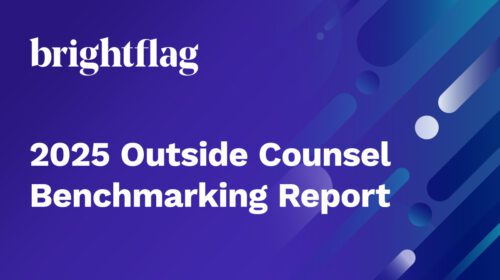It’s OK to Play Favourites: Identifying Your Core Outside Counsel Team
Evaluating and Choosing Core Outside Counsel
Specialisation. Speed. Scale. Corporate legal departments engage outside counsel for a variety of reasons, and continue to do so with great frequency.
Even after a turbulent few years globally, in 2022 the average in-house legal team allocated 46% of its total spend to external legal counsel, according to ACC researchers. Yet, despite the prominence of these outside counsel relationships they often feature a lack of formal oversight from the instructing corporate legal team. According to researchers from The Blickstein Group, only 43% of in-house legal teams have a standardised set of metrics for how they evaluate external law firm performance.
To their credit, in-house legal leaders have been gradually inching that figure upwards in recent years, however, the vast majority are still searching for an effective and sustainable way of putting their good intentions into practice.
If you count yourself among that cohort, it is worth considering the following attributes when trying to identify and choose outside counsel that provides the most value in your network.
Key Attributes of Top Outside Counsel
When evaluating your options before choosing outside counsel, it’s best to start from the broadest perspective possible. Recent instructions and notable collaborations will likely spring to mind when first thinking of a specific firm or individual lawyer, but their full value to your team really depends on a few bigger questions.
What is their level of expertise?
Implicit in initiating any outside counsel relationship is the concession that you require expertise beyond what your in-house resources can currently provide. You’re paying for their perspective, experience, and expertise.
At the very least, outside counsel should demonstrate clear knowledge of the substantive legal issues, applicable legislation and precedents. Ideally, they will also bring learnings from relevant past experiences and offer opinions on future trends or what they are generally seeing in the market.
How well do they understand your business?
The knowledge, experience and network of your outside counsel are only really valuable if viewed in the proper context for your business.
To ensure alignment, you’ll want to continuously evaluate your external partners’ understanding of:
- your company’s corporate vision & values;
- core drivers of growth for your business;
- your company’s competitors and the market within which you operate;
- relevant industry & regulatory trends; and
- your legal department’s key objectives and challenges.
Considering how influential this core understanding is across all other interactions, it’s something you’ll want to hear proactively affirmed by your chosen outside counsel. If they can’t articulate your priorities and key challenges, in their own words, then the relationship likely isn’t as strong as it needs to be.
What is their record of delivering results?
While the two questions above touch on somewhat subjective attributes, this third checkpoint is all about tangible and objective outcomes.
Asking yourself one simple question can assist you in assessing this particular attribute: did the outside counsel help you to achieve your desired result? Whether the result was closing a financing transaction, completing an acquisition or successfully concluding a litigation claim, it’s a question that you can answer with one word.
A second element which is worth considering in this context is more nuanced and looks at how effectively outside counsel delivered the result. For the transactional examples, this could mean closing the deal by a set deadline or keeping total fees below a certain threshold (which, in the case of the latter, provides all the more reason to clarify expectations upfront).
Financial Attributes to Consider When Choosing Your Top Outside Counsel
Money is the language of business and even the best academic lawyers must know their numbers. Here are three questions that will help you to verify the financial fitness of your external law firms.
How is their billing hygiene?
Neither in-house lawyers nor outside counsel want to spend their time compiling and reviewing bills and narratives but this information forms the bedrock of the business relationship.
The first metric to measure is timely submission. Sending invoices and accruals ahead of deadline is a courtesy you should expect from any responsible outside counsel partner.
Next, you’ll want to monitor the quality of these submissions. A few concrete indicators of billing hygiene include:
- invoice rejection rate;
- correct application of discounts;
- type of billing guideline violations (e.g. is the firm charging you for something they specifically agreed that they would not); and
- number and frequency of billing guideline violations.
It’s worth noting that flawless performance is neither common nor expected at the outset of outside counsel relationships, particularly where you may have recently introduced the firm to your outside counsel guidelines. What you’re really looking for is evidence of intention and progressively better billing behavior after you’ve had time to flag early errors and address lingering issues.
How effective is their budget management?
When choosing outside counsel, don’t believe the myth that legal spend is beyond prediction or control. The best outside counsel firms will make a point of clarifying your budget expectations in granular detail before your relationship begins in earnest.
When evaluating Spend vs. Budget reports, it’s important to look at both the end result and the level of variance. Yes, you’d naturally prefer to see all work delivered at or below budget, however, the occasional overrun is not only likely but, in certain circumstances, it may also be in the best interests of the matter on which the firm is instructed.
What’s most important is that outside counsel are transparent and proactively communicate expected deviations from the agreed budget and diligently seek to limit their scope and manage your expectations.
How cost-efficient is their approach?
Budget adherence can only be judged at the close of a matter or completion of a transactional milestone. By evaluating the efficiency of a law firm’s day-to-day execution, however, you can gain valuable early insights into what the final financial result may be. Success starts with efficiency and by ensuring that the right people are performing work at the appropriate level, so you’ll want to investigate how each law firm assigns work internally. For example, are partners taking on tasks that you feel are below their level of expertise? Is the firm making logical use of resources at each timekeeper level?
The next metric to look at is execution speed. A fast matter cycle time, for example, could reframe a seemingly exorbitant hourly fee as good value for money.
Finally, it’s time to benchmark these isolated indicators against peer performance. Taking a holistic view across all of your outside counsel relationships gives much greater meaning to data points like blended hourly rate and AFA adoption.
Operational Attributes of Top Outside Counsel
So far we’ve focused on big-picture objectives and financial metrics, however, those key criteria don’t address what is often the most impactful dimension of any successful outside counsel relationship: What does it feel like to collaborate with your outside lawyers on a weekly, daily or sometimes hourly basis?
How effective is their communication style?
This may be the most subjective evaluation area of all, but there are concrete and consistent attributes to look out for.
The first quality most clients want to experience from their outside counsel is responsiveness. Are they reliably available when needed and attentive to your requests, particularly where you need urgent support? Does their advice arrive in time for you to truly digest and apply their input?
Communication cadence needs to be weighed alongside clarity, however. Fast and frequent updates are of little value, for example, if you routinely find yourself spending time trying to decipher the advice you’ve just been sent.
Being accurate, solutions-focused and concise are qualities top outside counsel should strive to achieve in all client communications.
Do they display strong project management attributes?
A successful result is never fully guaranteed but it feels much more attainable when there is a coherent project plan guiding the intermediate steps.
When choosing outside counsel, be aware that the best firms don’t cut corners or allow clients to gloss over valuable procedural project management steps like:
- gathering the appropriate business requirements at the outset of the matter;
- scoping, assigning, & sequencing tasks;
- defining desired/acceptable outcomes;
- tracking progress & communicating risks; and
- capturing lessons learned.
Finally, this predefined framework should also retain the flexibility to suit your unique needs. Best-practice plans are the right starting point but experienced advisors know that sustainable solutions have to align with the cultural, technical, and operational realities of their client’s organisation.
Does their personality style enhance your relationship?
Even in the somewhat conservative arena of corporate legal services, there’s no denying the importance of individual personalities and relationships.
The first necessary—if slightly uncomfortable—question to ask is whether you have genuine rapport with your outside counsel. These are business partners you will work alongside and rely upon in sensitive and stressful situations, so a sense of trust and ease in your interactions can be a concrete business advantage.
When you’ve deferred to their expertise and counted on their contributions, did their actions, approach and advice inspire confidence? Did they help maintain morale and provide solutions-focused advice in challenging times? Did they show unexpected creativity at a pivotal moment?
Documenting tangible displays of these seemingly intangible attributes will add a vital dose of objectivity to the conversation when weighing your answer to the most important question of all: Is this a law firm I would hire again?
Building a Trusted Scorecard for Evaluating and Choosing Outside Counsel
Selecting and standardising your evaluation criteria for your external legal counsel is critical. You should seek to ensure that you add quantitative dimensions to qualitative observations and seek to apply these criteria efficiently and transparently. Each objective requires its own blend of fact and opinion — and the combined effort is beyond what most legal department leaders can reasonably fit into their personal calendars.
That’s just one more reason in-house legal teams are making calculated investments in both legal operations and legal tech because a solution that reliably directs you toward choosing outside counsel that perfectly suits your needs is a solution that quickly pays for itself.



